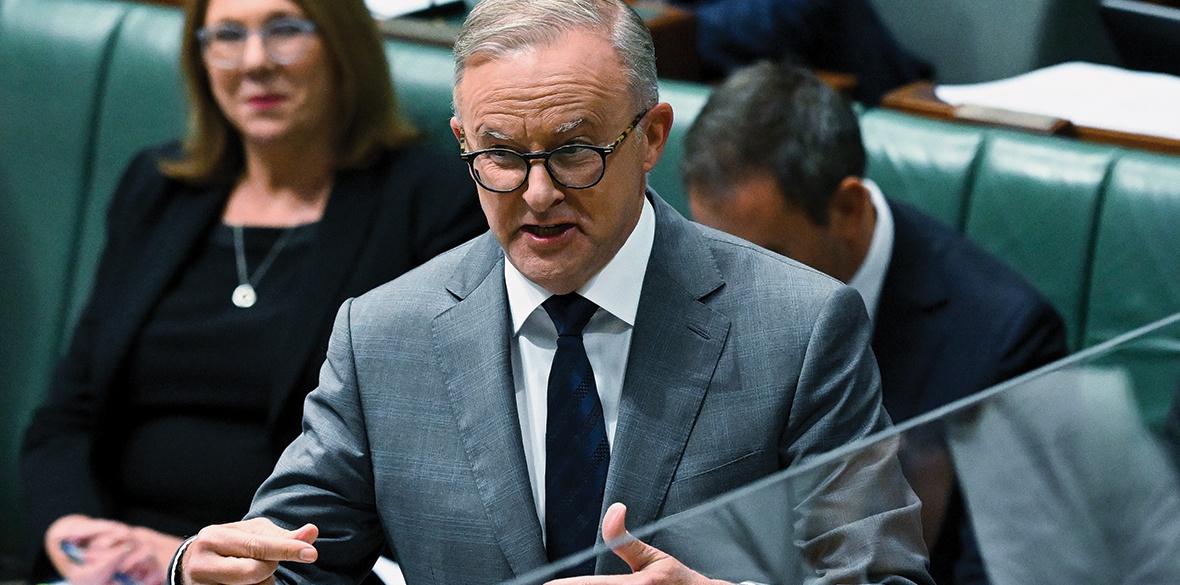This is the last article you can read this month
You can read more article this month
You can read more articles this month
Sorry your limit is up for this month
Reset on:
Please help support the Morning Star by subscribing here
PRIOR to the election of Labor’s Anthony Albanese in May 2022, the previous right-wing government under Scott Morrison had no interest in consulting workers and unions, and consequently, there was no balance.
That situation is now reversed, with the Albanese government recreating the tripartite bodies which used to be a hallmark of Australian government but which had been abolished under the Morrison and Liberal Party governments.
“Employer Organisations which enjoyed special access to Morrison and his government are bleating like distressed sheep,” says Andrew Dettmer the president of the Australian Manufacturing Workers Union (AMWU).
The bleating has now reached fever pitch with the demand by unions that they be part of the co-ordination arrangements for the new $15 billion National Recovery Fund, set up by the Labor government to revive the country’s industrial base and support transformational projects in sectors such as resources, medical science, transport and renewable energy.
Australian unions are demanding that businesses, including new companies, must have union agreements if they want to receive money from the proposed fund.
The Australian Council of Trade Unions (ACTU) has called on the Industry Minister Ed Husic to ensure unions have a seat on the fund’s board, saying the current model of independent directors is biased towards “the finance sector and private business.”
Employers have called on Husic — himself a former union official — to reject the proposal.
“The NRF is a major reform,” said Andrew Dettmer. “Bosses had special access under Morrison, and the views of workers were sidelined. Look where that led us.
“The Labor government has said that it’s in the interest of workers, and society, that we have greater bargaining power. It’s not just about getting a long-overdue pay rise; it’s also about the government giving preference to recipients of grants to those employers who want to do the right thing and reach an agreement with their workers about a good union agreement on pay and conditions.”
Husic said the fund would emulate the $10bn Clean Energy Finance Corporation, which makes a positive return on investment. But unions have taken issue with that model because CEFC had no obligations to create “secure jobs with decent working conditions.”
But the ACTU said that legislation for the fund should be changed to ensure it is “creating secure, well-paid jobs, and unionised jobs.”
It also proposed the NRF adopt a labour standards policy that would bind companies receiving investment from the fund and include obligations to promote secure work, collaborate with union officials and collectively bargain. If a business that reviewed money from the fund breached the NRF’s standards then workers would be able to complain and “appropriate remedial action must be taken.”
The AMWU says the fund should also impose a secure jobs code that would include at a minimum an “enterprise agreement with unions as a pre-condition of tender.”
“In the case of start-ups, we may consider that a memorandum of understanding to enter into an agreement as part of the tender process, but the agreement must be finalised prior to award of tender,” the union said.
As a condition companies would have to commit to direct employment, including paying “labour hire” the same as the direct workforce, and minimum ratios of apprentices, the AMWU said.
But employers said they hoped “the government, and later the independent board overseeing the fund, would immediately knock on the head these blatantly self-interested proposals.”
The ACTU is pushing for two union directors on the NRF board as part of its preferred tripartite model of unions, industry and other experts or government representatives and warned independent directors risked “predominantly drawing from the finance sector and private business, rather than having a fair representation of worker voices.”
“The neoliberal experiment of trickle-down economics, comparative advantage and all the rest, is over. The Albanese government needs to deliver for workers, and have a worker voice at the table. No more, no less,” said Dettmer.
Tony Burke is the president of the Confederation of Shipbuilding and Engineering Unions and co-chair of the Campaign For Trade Union Freedom — www.tradeunionfreedom.co.uk.







